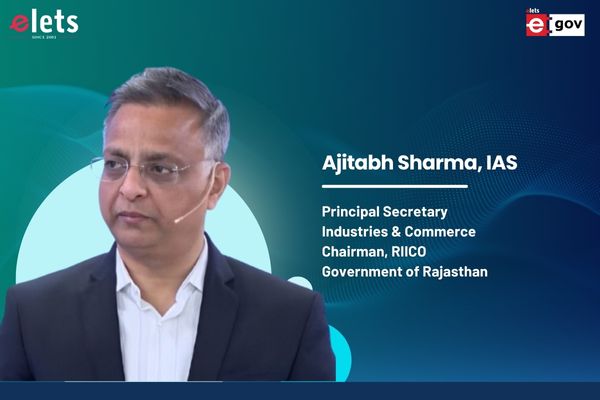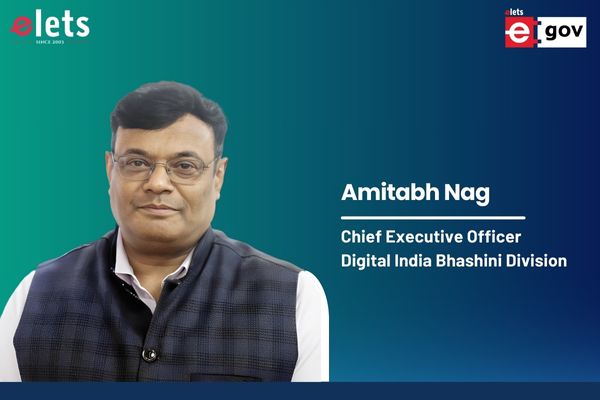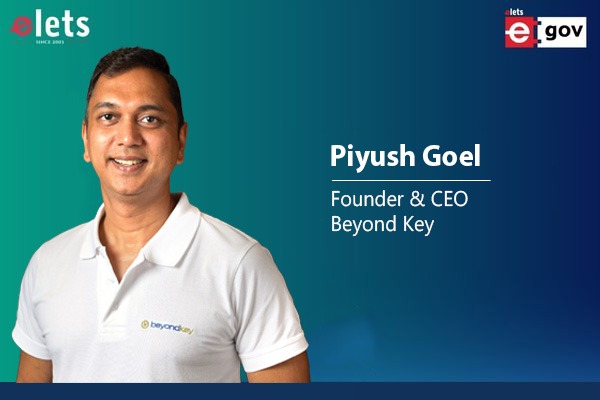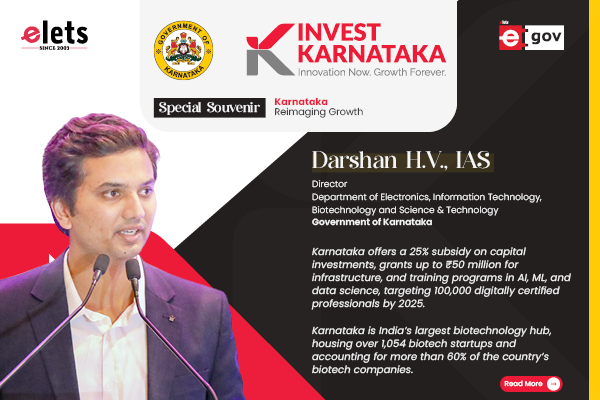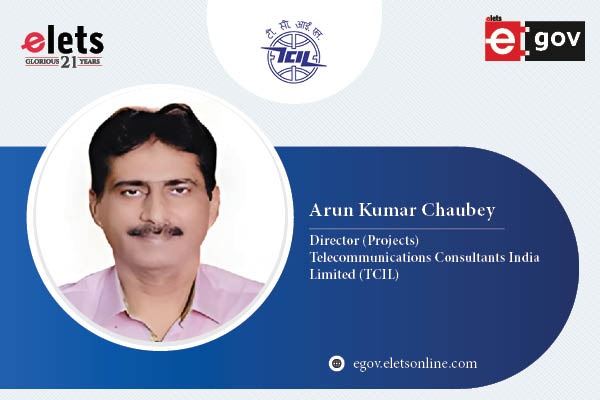
In the dynamic telecommunications and IT sectors, adaptability and innovation are essential for success. As the Director of Projects at TCIL, I’ve gathered valuable insights that shape effective project management and leadership. This discussion highlights key lessons from various initiatives, showcases impactful projects driving community and industry change, and explores innovative solutions that position TCIL at the forefront of transformation in telecommunications and IT shared Arun Kumar Chaubey, Director (Projects), TCIL in an exclusive conversation with Elets News Network (ENN). Edited excerpts.
As the Director of Projects at TCIL, could you share some of the key lessons you’ve learned from various projects over the years that continue to influence your approach to project management and leadership?

Over the years, my experience at TCIL has provided me with invaluable insights into effective project management and leadership. One critical lesson is the importance of adaptability. The telecom and IT sectors are dynamic, requiring quick decision-making and a willingness to pivot strategies when necessary.

Another key takeaway is the value of stakeholder management. Successful projects depend on clear, consistent communication with clients, partners, government bodies, and team members. Building and maintaining trust is essential to ensure alignment across all phases of a project. Additionally, I’ve learned the significance of risk management. Every project brings unique challenges, and identifying potential risks early on allows for proactive mitigation strategies, reducing disruptions and ensuring timely delivery.

Finally, empowering teams has been central to my leadership approach. Fostering a culture of collaboration, innovation, and accountability leads to high-performing teams that consistently deliver results. Encouraging team members to take ownership of their roles not only enhances productivity but also builds a motivated workforce capable of navigating challenges with agility. These lessons continue to influence my approach, enabling me to lead TCIL’s projects effectively and sustainably in an ever- evolving industry landscape.

TCIL has been involved in numerous significant projects. Can you highlight some of the key initiatives you have led? What impact have these initiatives had on TCIL’s growth and the sectors it operates in?
I have had the privilege of spearheading several impactful projects at TCIL, which have driven both growth and innovation. One standout project is the BharatNet VSAT Project, a massive initiative aimed at providing satellite-based communication to over 5,500 remote locations, including Gram Panchayats and border outposts. This project has significantly enhanced digital inclusion, bringing essential services such as telemedicine, online education, and e-governance to underserved areas.
Another critical project is the BSNL Super Edge Project, where we upgraded the IP/ MPLS network to support future services such as 4G and enterprise solutions, greatly enhancing BSNL’s network capacity and scalability. These initiatives have not only strengthened TCIL’s position as a leader in telecom infrastructure but also expanded our presence in rural and underserved markets. This strategic expansion has allowed TCIL to contribute to India’s digital transformation efforts across multiple sectors, including education, healthcare, and governance, fostering inclusive socio-economic development. Through these projects, TCIL continues to play a vital role in bridging the digital divide and enabling
innovation at a national scale.
Can you share a recent project that you believe had a substantial impact on the community or industry? What were the challenges, and how were they overcome?
One of the recent projects that has had a transformative impact on the community is the Telangana Fiber Grid (T-Fiber) Project. This ambitious initiative aims to provide high-speed broadband connectivity to rural areas across Telangana, enhancing access to essential services such as telemedicine, online education, and e-governance. The project directly addresses the digital divide, bringing previously isolated communities into the digital economy. One of the biggest challenges we faced was navigating geographical constraints, particularly in hilly and forested areas, which made laying optical fibre cables difficult.
Additionally, securing regulatory approvals, such as forest clearance permits, added complexity. These challenges were overcome through close collaboration with local authorities and the use of advanced GIS technologies to optimize route planning and minimize environmental impact. The successful execution of this project underscores TCIL’s commitment to digital inclusion and demonstrates our capability to deliver large-scale infrastructure solutions that significantly improve the quality of life for rural populations. The T-Fiber project is a model for how technology can be used to bridge gaps in accessibility and ensure that digital services are available to all.
TCIL is known for its technological advancements. Can you discuss any innovative solutions or technologies that TCIL has recently implemented to improve project outcomes? Are there any emerging technologies that you are excited about integrating into projects?
At TCIL, innovation is at the core of our project execution. Recently, we have implemented AI-driven network optimization, which allows us to predict and manage network traffic with unprecedented precision. This has significantly reduced network downtime and improved overall service reliability. Another exciting development is our work in 5G technologies, particularly through the 100 5G Use Case Labs initiative. This program is fostering innovation by enabling the development of 5G applications across industries such as healthcare, agriculture, and smart cities
In addition, TCIL is increasingly focusing on integrating Internet of Things (IoT) solutions in projects like smart building management systems, which optimize energy use and enhance security through real-time monitoring. Looking ahead, we are particularly excited about the potential of blockchain technologies in sectors like fintech and cybersecurity, where we are exploring the use of decentralized systems to ensure secure, transparent transactions. These emerging technologies are set to revolutionize our projects, driving greater efficiency and delivering high- impact solutions that benefit both our clients and the communities we serve.
Are there any specific sectors or areas where TCIL plans to expand its presence shortly?
TCIL is actively expanding its presence into several high-growth sectors. A key focus is data centres, where we are working on large-scale projects to build and manage next-generation facilities that support cloud computing and storage solutions. Our recent work in digital transformation across sectors like education, healthcare, and governance has also positioned us as a leader in deploying innovative IT solutions that modernize public services and enhance citizen experiences. Another area of expansion is in new-age telecom solutions, where TCIL is leveraging its expertise in 5G technology to create smart infrastructure and IoT-enabled systems for smart cities. In addition, e-health remains a priority, with initiatives in telemedicine and health ATMs that aim to transform healthcare delivery, particularly in rural areas. The fintech sector also presents significant opportunities, especially through the development of blockchain-based digital banking and e-KYC platforms. Finally, cybersecurity, particularly through advanced measures like quantum key distribution (QKD), is becoming an integral part of our portfolio as we aim to provide secure and resilient communication networks for the future.
What are some of the biggest challenges you foresee in the telecom and IT project sectors? According to you, what strategies or innovations will help overcome these challenges?
The telecom and IT sectors are facing several key challenges, the foremost being the rapid pace of technological advancements and the need for scalable infrastructure to support emerging technologies like 5G, IoT, and AI. Another critical challenge is cybersecurity, as the proliferation of connected devices and the increasing sophistication of cyber threats pose significant risks to both network integrity and data security. One of the strategies to address these challenges is the adoption of AI-driven solutions that optimize network performance and enhance predictive maintenance, reducing downtime and operational costs.
Additionally, collaborative innovation with industry leaders and academic institutions will be key to developing solutions that keep pace with technological evolution. Quantum-safe cryptography and other advanced encryption technologies are being integrated into TCIL’s cybersecurity framework to mitigate risks associated with emerging threats. By investing in research and development, enhancing cross-industry partnerships, and prioritizing sustainable, scalable solutions, TCIL is well-positioned to navigate these challenges and continue delivering innovative, secure, and efficient telecom and IT projects.
Be a part of Elets Collaborative Initiatives. Join Us for Upcoming Events and explore business opportunities. Like us on Facebook , connect with us on LinkedIn and follow us on Twitter, Instagram.
"Exciting news! Elets technomedia is now on WhatsApp Channels Subscribe today by clicking the link and stay updated with the latest insights!" Click here!




